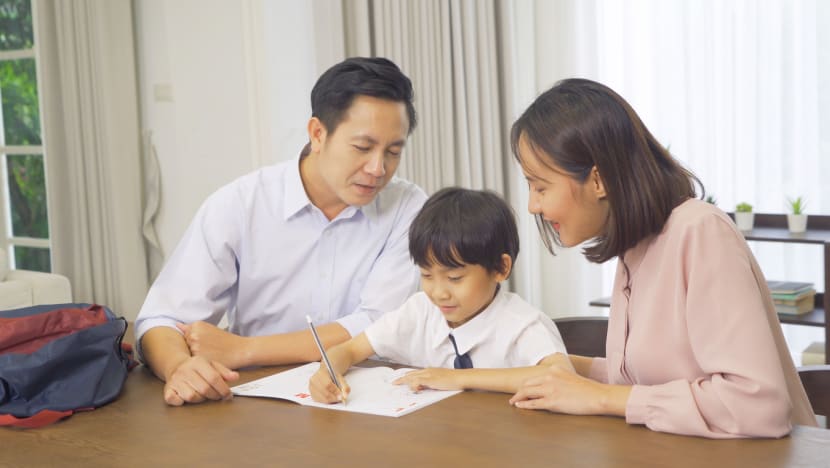Commentary: What my first time as a PSLE parent has taught me in this second season
During this stressful rite of passage for local students, it’s worth reflecting on what parental love and support could look like, says second-time PSLE parent Cherie Tseng.


This audio is generated by an AI tool.
SINGAPORE: At the tail end of the hazy COVID-19 years, my eldest son took his Primary School Leaving Examination (PSLE) amid considerable uncertainty. This already stressful rite of passage for Singaporean students was intensified by the new grading system, speculations about cut-off points, and our collective attempt to regain stability post-pandemic.
This year, my second son enters the fray. Ready player two.
I should feel an odd sense of familiarity – after all, it’s not my first rodeo, so to speak. Yet, as I navigate this experience with my second child, I am keenly aware that this is a different child in a different time.
Like the years before, the overlap of the Direct School Admission (DSA) season with PSLE preparations only added to the pressure, as students juggled academics with DSA applications, trials and interviews. The final DSA decisions often coincide with Primary 6 prelims – a double-edged sword that boosts confidence for some but deals a blow to others.
Given the packed school calendar, especially for the graduating class, such scheduling challenges – though unavoidable – heighten the anxiety of an already demanding year, especially for those without a secondary school affiliation as a fallback.
MOVING THE NEEDLE ON STUDENT STRESS
Changes have been made to the education system over the years to ease stress for students and reduce the overemphasis on academic grades, such as a new grading system for the milestone PSLE, the removal of mid-year exams in most academic levels and full subject-based banding in secondary school.
In a video this June, Prime Minister Lawrence Wong emphasised the need to broaden the definition of success and build a society that “allows space for U-turns, side steps, slowdowns, pauses, experimentation and outliers”.
Findings from recent studies and surveys are familiar: More Singaporean students reported feeling very anxious for a test even if they were well prepared, compared to the OECD average, in the 2017 Programme for International Student Assessment (PISA) on student well-being. Leading stressors conveyed to mental health professionals and the Samaritans of Singapore by youths aged 10 to 19 almost always include academic stress. Unsurprising with the number of “life altering examinations” in that time period.
It will take time to see whether Singapore’s efforts pay off, but I can’t help but wonder what it will take to truly move the needle on student stress.
In questioning the education landscape, the rules of the rat race or the multiple pathways of success, perhaps parents often overlook what’s right in front of us: Ourselves and the role we play in this grand endeavour of education.
PARENTS AND THE ROLE THEY PLAY
It’s not just how parents’ expectations contribute to their stress, or manage our own stress as a PSLE parent. It’s also how we take an interest in their learning, in the day to day.
The 2022 PISA study focused on Parenting Involvement showed that only about half of Singapore students said that their parents took an interest in their learning at least once a week, compared to the OECD average of 66 per cent. Some parents interviewed by TODAY after the study findings were released in December 2023 cited the complex nature of homework, a reliance on tutors, as well as the desire for children to learn how to study independently, as reasons for this hands-off approach.
I do my best to go over science answering techniques with my PSLE taker; mostly survivable because I am armed with the answer sheet. But I’d be honest that I’m grateful I have an elder son to consult.
Last week, I made my husband attempt a maths problem sum about books and shelving from our son’s preliminary exam papers. He got there in the end but if he were taking the paper, he would have wasted far too much time.

The PISA report also showed a significant correlation between active parental engagement and enhanced academic performance even after adjusting for socio-economic factors.
And it’s not just about helping them with homework or revisions, especially for working parents. Students who regularly engage with their family – whether by sharing meals or discussing their school day – scored 16 to 28 points higher in Mathematics.
Clinical psychologist Becky Kennedy emphasises the importance of building “connection capital” between parent and child – which she defines as the efforts we make to understand and connect with our kids, even when we disagree. And under the spectre of a big examination, there will always be a lot of head-butting, big feelings and not seeing things eye-to-eye.
But her message is clear from her book: It’s about nurturing their growth with compassion, understanding and allowing them the freedom to learn from their mistakes.
PARENTING WITH CONNECTION, GRACE AND FORGIVENESS
In the stranglehold of a stressful season like looming national examinations, it’s worth reflecting on what parenting unconditional love and support could look like.
Some days it’s helping him negotiate workload balance – schoolwork feels relentless and endless. Other days are about making sure he still gets sufficient activity time to blow off steam and to shake the wiggles out.
We have pared down all “extraneous” activities, buffered time to decompress and prioritised getting enough sleep. That, in particular, has benefited me: I am less fatigued even if I am still busy. And consequently, less short-tempered when things don’t unfold as planned.
As Son #2 gears up for the PSLE adventure, I recite the well-loved words from the children’s book We’re Going On A Bear Hunt by Michael Orsen and Helen Oxenbury: “We can’t go over it, we can’t go under it … we’ve got to go through it.”
And in this case, I hope my second son knows that we are going through this together. And should ever the bear get too scary, we do what the family in the book does: Run to where we feel safe - home.
Cherie Tseng is Chief Operations Officer at a local fintech company, a mother of three and editor with The Birthday Collective.


















